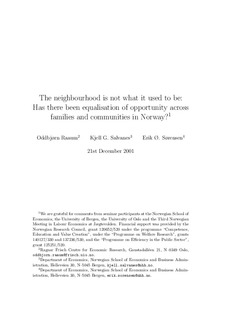The neighbourhood is not what it used to be : has there been equalisation of opportunity across families and communities in Norway?
Working paper
Permanent lenke
http://hdl.handle.net/11250/162996Utgivelsesdato
2001-12Metadata
Vis full innførselSamlinger
- Discussion papers (SAM) [657]
Sammendrag
Parents influence their children's adult outcomes through economic and genetic
endowments, transmission of cultural values and social skills, and through choice
of residential location. Using a variance decomposition framework which provides
bounds on the effect of families and neighbourhoods, we find important effects
of family characteristics as well as residential location on educational attainment
and adult earnings in Norway. Families are more important than neighbourhoods
as the correlations among siblings are significantly higher than among children
growing up in the same local community. Sibling correlations are estimated
to be a little lower than for the US, while correlations between neighbourhood
children in Norway are found to be significantly weaker than in the US. Unlike
previous studies, we also assess changes over time by studying children growing
up around 1960 and 1970. While family effects are permanent over time, the
impact of neighbourhoods is reduced by half in size from 1960 to 1970 and we
link this result to several policy changes in the 1960s aimed at increasing equality
of opportunity in Norway. Our results differ from previous US studies, suggesting
that the role of families and neighbourhoods in explaining the degree of equality
of opportunity and social mobility depends on labour market institutions and redistributive policies.
Utgiver
Norwegian School of Economics and Business Administration. Department of EconomicsSerie
Discussion paper2001:36
